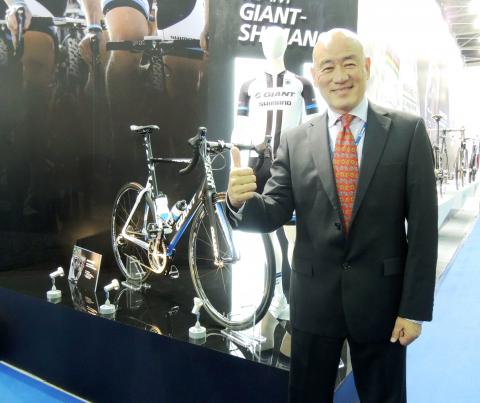Bicycle maker Giant Manufacturing Co (巨大機械) yesterday said that it is likely to expand its YouBike public bicycle rental system to Changhua County, Greater Taichung and New Taipei City.
The company has signed a contract with the Changhua County Government to launch the cycle sharing system there, which would make the county the second place in Taiwan to offer the service, Giant chief executive Anthony Lo (羅祥安) told reporters yesterday.
The Greater Taichung City Council is in the process of deciding whether to install the system there too, he added.

Photo: Yang Ya-min, Taipei Times
In New Taipei City, the company has set up trial systems in Xindian (新店) and Xizhi (汐止) districts that connect with the cycle network in Taipei, Lo said, adding that the New Taipei City Government will decide whether to increase the number of rental sites based on the results of the trials.
Giant also plans to install an additional 173 YouBike rental sites and put 5,030 bicycles in circulation in Taipei by the end of the first half of next year, Lo said.
Lo said the company expects its service in the capital to break even next year.
According to Lo, the service is easier to operate in cities with large populations and many commuters, such as Taipei, London, Paris and New York.
However, Lo said that Taipei’s cycling infrastructure can still be improved.
Citing Canadian bicycle sharing system BIXI’s bankruptcy filing in January, Lo said that such services are not likely to generate much profit for the company operating them because rental fees have to be kept low enough for the general public to be able to access the service.
Despite the low profitability of public cycle networks, Giant’s Taipei sales still rose after it launched the YouBike system there.
According to the company, each of the system’s bikes costs about NT$10,000 (US$330) because they are designed to withstand frequent use.
The bicycles are built to be used 13 times a day on average, much more often than the twice a day use that most other bicycles average, the company said.
Giant expects to post 5 to 10 percent revenue growth this year, eyeing better weather around the world and a stronger global economy, Lo said.
He added that the company forecasts sales to China to grow by 10 percent this year, while the average selling price of its products is expected to remain at about US$300 per unit.
Last year, the company posted revenue of NT$54.32 billion, up 0.36 percent from NT$54.13 billion a year ago, according to its filing with the Taiwan Stock Exchange.
Giant distributed 6.31 million bicycles worldwide last year for an annual rise of 1.5 percent, Lo said.
Last year, the company shipped 2.4 million bicycles to China, up from approximately 2 million a year earlier, he said.

Sweeping policy changes under US Secretary of Health and Human Services Robert F. Kennedy Jr are having a chilling effect on vaccine makers as anti-vaccine rhetoric has turned into concrete changes in inoculation schedules and recommendations, investors and executives said. The administration of US President Donald Trump has in the past year upended vaccine recommendations, with the country last month ending its longstanding guidance that all children receive inoculations against flu, hepatitis A and other diseases. The unprecedented changes have led to diminished vaccine usage, hurt the investment case for some biotechs, and created a drag that would likely dent revenues and

Global semiconductor stocks advanced yesterday, as comments by Nvidia Corp chief executive officer Jensen Huang (黃仁勳) at Davos, Switzerland, helped reinforce investor enthusiasm for artificial intelligence (AI). Samsung Electronics Co gained as much as 5 percent to an all-time high, helping drive South Korea’s benchmark KOSPI above 5,000 for the first time. That came after the Philadelphia Semiconductor Index rose more than 3 percent to a fresh record on Wednesday, with a boost from Nvidia. The gains came amid broad risk-on trade after US President Donald Trump withdrew his threat of tariffs on some European nations over backing for Greenland. Huang further

Nvidia Corp’s GB300 platform is expected to account for 70 to 80 percent of global artificial intelligence (AI) server rack shipments this year, while adoption of its next-generation Vera Rubin 200 platform is to gradually gain momentum after the third quarter of the year, TrendForce Corp (集邦科技) said. Servers based on Nvidia’s GB300 chips entered mass production last quarter and they are expected to become the mainstay models for Taiwanese server manufacturers this year, Trendforce analyst Frank Kung (龔明德) said in an interview. This year is expected to be a breakout year for AI servers based on a variety of chips, as

HSBC Bank Taiwan Ltd (匯豐台灣商銀) and the Taiwan High Prosecutors Office recently signed a memorandum of understanding (MOU) to enhance cooperation on the suspicious transaction analysis mechanism. This landmark agreement makes HSBC the first foreign bank in Taiwan to establish such a partnership with the High Prosecutors Office, underscoring its commitment to active anti-fraud initiatives, financial inclusion, and the “Treating Customers Fairly” principle. Through this deep public-private collaboration, both parties aim to co-create a secure financial ecosystem via early warning detection and precise fraud prevention technologies. At the signing ceremony, HSBC Taiwan CEO and head of banking Adam Chen (陳志堅)